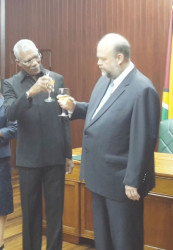Over a year after the last US ambassador to Guyana departed local shores, new envoy Perry Holloway presented his Letter of Credence to President David Granger yesterday and committed to work to remove obstacles to national development.
“The United States of America stands ready to work with our Guyanese friends to eliminate impediments to national development,” Holloway said. He said that his government stands ready to work with Guyana not only on democracy building but in the holistic development of the nation.
He referred to Granger’s inaugural address to the nation upon being elected president earlier this year, saying it was a clarion call to the international community. “You reminded us both of the historic divisions that have marred the development of this society and the need for all of us to work in partnership to achieve social inclusion. It is my intention to partner closely with your government as you work to achieve this lofty goal,” he asserted.
“

Together, we can ensure that all Guyanese enjoy equality of opportunity without regard to race, ethnicity, creed, gender, sexual orientation, or disability. Doing so will not only assist political reconciliation, it will also promote national development,” Holloway added.
He also raised the issue of long-delayed local government elections, which the foreign missions as well as local civil society had pressured the previous PPP/C government to hold.
“I wish to pledge my government’s continued support to the holding of local government elections before the end of 2015, [and] hopefully with the use of electronic tabulation so that we can all have a few less sleepless nights as we await the results,” Holloway said.
He related too that the US will continue to mobilise private sector resources for the development of cheaper sources of renewable energy here. Holloway said he was confident that through public sector reform and public-private partnerships, Guyana can create the business climate necessary to drive socio-economic development for all its people.
The new ambassador also promised a renewed commitment to the strengthening of the relationship between the two States to combat social issues faced. “Guyana is a land of tremendous natural resource potential. It is past time, however, to harness that potential responsibly and sustainably for the benefit of the Guyanese people, while ensuring preservation of your unique biodiversity for the next generation,” he declared.
He also noted the challenges faced. “We acknowledge the changes which have occurred in (the) security situation in our hemisphere, particularly over the past two decades. These include the prevalence of transnational crimes such as terrorism, trafficking in persons, trafficking in illegal narcotics, trafficking in illegal weapons and money-laundering, to all of which small states are very vulnerable,” he asserted.
Continued interest
Although not making direct reference to the Guyana/Venezuela border controversy which has flared up over the past months, Granger, in accepting Holloway’s credentials, called for the protection of small countries and said that Guyana looks forward to the continued support of the US especially in the preservation of her territorial integrity.
“Guyana looks forward to the support of the United States of America in its legitimate quest to protect itself against terrorism, transnational crime and threats to its territorial integrity,” the President said. “We are encouraged by the continued interest that the USA has shown in the security of small Caribbean states. The USA’s geopolitical role will be fundamental to addressing the many challenges faced by the Caribbean region. We wish to urge the USA to use its influence in the hemisphere and on the international stage to reject the use, or threat of the use of force between States, to promote development and to preserve the Caribbean as a zone of peace,” he declared.
Granger said that being a member of Caricom, which he termed the largest group of the smallest states in the world, Guyana desires the Caribbean to be a zone of peace.
“We desire security that is essential to promoting and consolidating democracy, creating a cohesive society and ensuring the good life for all. We desire respect for our sovereignty and territorial integrity. Guyana’s geographical location on the mainland of the South American continent makes it vulnerable to penetration by transnational criminal networks and territorial claims – both of which can undermine peace and security,” he said.
“Guyana is resolved to defend its territory, dismantle transnational criminal networks and develop its natural resources for the benefit of its people. The capabilities of criminal cartels, however, can exceed those of small states. We must seek succor and support through partnerships with other States which have an interest in preserving the Caribbean as a zone of peace,” he added.
At a subsequent press conference, Granger said he believes that small states are important in the global scheme of things. He said that US President Barack Obama’s creation of the Caribbean Basin Security Initiative (CBSI) was a microcosm of the US commitment to this region and he believes that programme will continue to be the US main area of focus and not small state security at this time.
However, he noted that the superpower can still wield its power. “They have influence and they can exert that influence to modify the behaviour of small states and they have been able to do that in the past,” he said.
Holloway had assured of the US continued support of the CBSI. “We will work with you to combat transnational organised crime under the Caribbean Basin Security Initiative. We will support the government’s efforts to bring about increased transparency and accountability in the management of public resources and to protect the environment,” he said.





